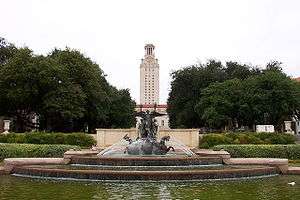Littlefield Fountain
 Littlefield Fountain in front of the Main Building | |
| Artist |
Pompeo Coppini (sculptor) Paul Cret (architect) |
|---|---|
| Year | 1933 |
| Type | Memorial statue and fountain |
| Location | The University of Texas at Austin |
| 30°17′02″N 97°44′23″W / 30.28389°N 97.73972°WCoordinates: 30°17′02″N 97°44′23″W / 30.28389°N 97.73972°W | |
| Owner | The University of Texas at Austin, with funds from a trust established by Major George W. Littlefield |
Littlefield Fountain is a monument by Italian-born sculptor Pompeo Coppini, located on the main campus of The University of Texas at Austin in Austin, Texas.
The fountain was built with money from a $250,000 trust established by Major George W. Littlefield as a memorial for University of Texas students and alumni who died in The Great War, now commonly known as World War I.[1] It was unveiled in 1933, at a time when the Old Main Building was still in use.[2]
The memorial fountain is enscribed in Latin with BREVIS A NATURA NOBIS VITA DATA EST AT MEMORIA BENE REDDITAE VITAE SEMPITERNA. Translation - "A short life hath been given by Nature unto man; but the remembrance of a life laid down in a good cause endureth forever." Beneath this inscription is a memorial bronze plaque that lists all UT students and alumni killed in The Great War.
Major George W. Littlefield first envisioned this monument to be an arch that would honor Confederate heroes. Given that an arch would cost more than the $250,000 Littlefield had intended in donating, Coppini persuaded him to make a fountain instead. Coppini was also responsible of the idea of dedicating the fountain to the students that had died in World War I, arguing that a Confederate monument would only prolong the sentiment of division that was still present from the Civil War. Coppini's actual words were: "As time goes by, they will look to the Civil War as a blot on the pages of American history, and the Littlefield Memorial will be resented as keeping up the hatred between the Northern and Southern states."
In Coppini's original design, the fountain was to also display obelisks that would hold bronze statues of the biggest names in the civil war, both from the confederate and the union sides. The university ended up shutting this down this idea given that its cost would surpass the $250,000 that Littlefield had set aside for this work after his passing. Without the obelisks Coppini felt that the final result did not convey what he had originally intended, which was to glorify the union of two former enemies (north and south) during World War I.
References
- ↑ "Public Spaces". Green Growth. Austin History Center. p. 2. Retrieved 2006-07-02.
- ↑ "The Littlefield Fountain". Campus Structures at The University of Texas at Austin. Center for American History. Retrieved 2006-07-02.
